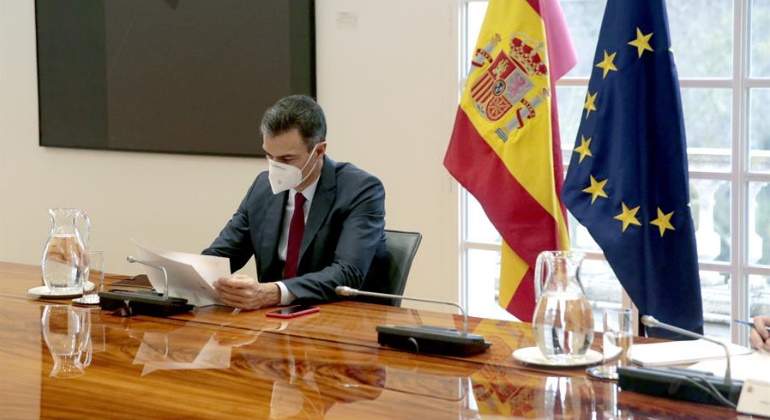The President of the Government, Pedro Sánchez, will announce this Saturday a remodeling of his coalition Government, with the inputs of Félix Bolaños (Presidency), Pilar Llop (Justice), José Manuel Albares (Foreign Affairs), Diana Morant (Science and Innovation) , Pilar Alegría (Education), Isabel Rodríguez (Territorial Policy and Government spokesperson) and the passage of Miquel Iceta to Culture and Sports. On the other hand, Nadia Calviño will become the first vice president of the Government, with Yolanda Díaz as second and Teresa Ribera as third.
This causes the departures of Carmen Calvo, Juan Carlos Campo, José Luis Ábalos, Arancha González Laya, Isabel Celaá, José Manuel Rodríguez Uribes and Pedro Duque. Yes, the five members of the Government belonging to United We Can and the entire economic bloc remain in office.
In this way, the Minister of Economic Affairs and Digital Transformation, Nadia Calviño , will hold the first government vice presidency. The announcement caught him in Venice, at the meeting of finance ministers and central bank governors of the G20.
Félix Bolaños joins the ministerial team , until now Secretary General of the Presidency, who becomes the head of the Ministry of the Presidency, Relations with the Courts and Democratic Memory, replacing Carmen Calvo.
Isabel Rodríguez will be the new spokesperson for the Executive, in addition to taking charge of the Ministry of Territorial Policy. She was a senator from 2004 to 2007 and has been a congressional deputy since 2011 and mayor of the city of Puertollano for two years.
José Manuel Albares will become Minister of Foreign Affairs. He was already the adviser of Sánchez’s branch in his first stage at the head of the PSOE, after which he became an adviser in his Cabinet of the Presidency. Since 2000 he has been linked to Spanish foreign policy with destinations in Latin America, Africa and Europe and since February 2020 he has been an ambassador to France.
Diana Morant , mayor of Gandía since 2015, will lead the Ministry of Science and Innovation. She is a telecommunications engineer and began her political career in the PSOE in 2011.
Also joining is María Pilar Llop Cuenca , who has held the presidency of the Senate since December 2019. Llop was already a Government Delegate for Gender Violence between 2018 and 2019. After her experience as a magistrate, she began her political career as a deputy in the Assembly Madrid in 2015. She will be the new Minister of Justice.
Pilar Alegría will lead the Ministry of Education and Vocational Training, thus leaving her position as Government delegate in Aragon, which she has held for a year and a half. Previously she was Minister of Innovation, Research and University of the Government of Aragon.
For his part, Miquel Iceta will become the head of Culture and Sports, leaving the Ministry of Territorial Policy and Public Function, in which he has been for less than half a year. In addition, he is the first secretary of the PSC since 2014.
This is the first remodeling of the Council of Ministers of this legislature that is not forced by the voluntary departure of any of the holders of the portfolios.
Since the first coalition government in the history of Spain was formed on January 13, 2020, with members of the PSOE and Podemos, some changes had taken place. The march of Salvador Illa lead the PSC made him leave the Ministry of Health, where he replaced Carolina Darias – despite the Moncloa website following her placing as Minister of Territorial Policy. Miquel Iceta was then in charge of the territorial portfolio. On the other hand, the resignation of Pablo Iglesias to attend the Madrid elections made Ione Belarra assume the Ministry of Social Rights.
Departures
The most relevant exit is that of Carmen Calvo , who will leave the ministry of the Presidency and the vice-presidency of the Government. Calvo, who has been Sánchez’s right-hand man since he regained the general secretary of the PSOE, and ruled the Ministry since 2018. In the 2020 remodeling, his portfolio acquired the surname of ‘Historical Memory’ and lost the name of Equality, which It became a portfolio of its own in the hands of Irene Montero. Precisely with her he has had several confrontations, the last of them on the occasion of the ‘Trans Law’, approved a few days ago.
José Luis Ábalos , until now Minister of Transport, Mobility and Urban Agenda, leaves the executive; a position that he began to run in 2020, after leaving the position as Minister of Development that he had held since 2018.
At the head of the portfolio, Ábalos generated certain disputes in the Government due to his discrepancies with the United We Can sector regarding price regulation of rents, one of the demands made by this party to form an executive with the Socialists. He was also in the eye of the hurricane for his meeting with the Venezuelan leader Delcy Rodríguez at the Barajas airport.
Among the exits is that of Juan Carlos Campo , Minister of Justice since January 2020, when he replaced Dolores Delgado, the current State Attorney General.
The socialist judge and deputy entered the Government to lead this portfolio in full political and social hangover after the exhumation of the remains of the dictator Francisco Franco. Campo has been responsible for directing the granting of pardons to pro-independence leaders convicted of sedition, which has earned him numerous criticisms from the opposition and sectors opposed to this grace measure.
Arancha González Laya was the Minister of Foreign Affairs since January 2020, when she replaced Josep Borrell, currently High Representative of the EU. González Laya has been in the eye of the media hurricane since the leader of the Polisario Front, Brahim Gali, was welcomed in Logroño in May, something to which Morocco responded by promoting a migratory invasion in Ceuta.
A judge this week urged the Foreign and Defense ministries to hand over the documentation allowing Gali access to Spain, which apparently was not asked for a passport. Today, the government’s daily agenda included a meeting between González Laya and his Israeli counterpart.
Isabel Celaá has been Minister of Education and Vocational Training since 2018 and government spokesperson until January 2020. At the head of this portfolio, Celaá has undertaken the new, and controversial, restructuring of the Spanish educational system with the approval of what is known as the Celaá law . The harsh criticism received by the opposition and conservative sectors of society for said law, are added to those caused as a result of the management during the pandemic, especially for the protocols for returning to the classroom.
Pedro Duque , who has been part of Sánchez’s team since he came to the Government in 2018, also leaves the Council of Ministers . However, his portfolio of Science, Innovation and Universities was divided and the Universities segment ceded.
José Manuel Rodríguez Uribes , Minister of Culture and Sports from January 2020, when he replaced José Guirao. Rodríguez Uribes has been harshly criticized for the lack of aid to the culture sector, one of the hardest hit by the pandemic. His statements about whether or not he should go to the bulls also raised blisters.
Although without a ministerial position, Sánchez also dismisses his ideologue and strategist, Iván Redondo , who was chief of staff. In his place will enter Óscar López .



